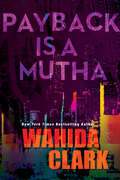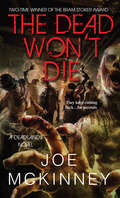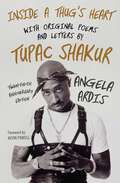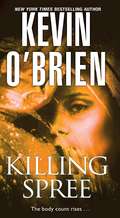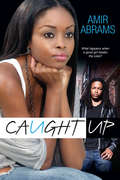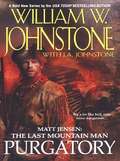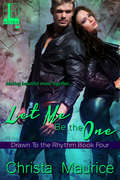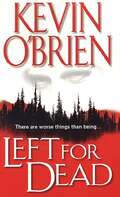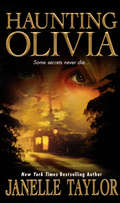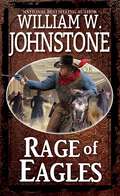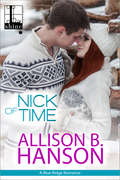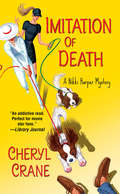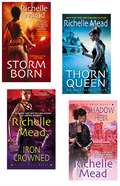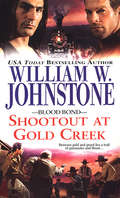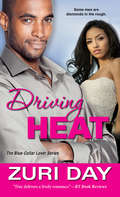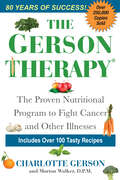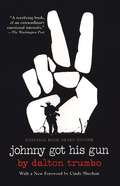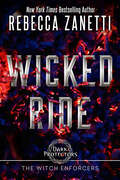- Table View
- List View
Payback Is A Mutha (Payback (clark) Ser. #1)
by Wahida ClarkIn this gritty urban drama by the New York Times bestselling author of Honor Thy Thug, a woman who has everything has everything to lose.Brianna and Shan couldn't be more different. Brianna believes that men were born to bankroll her lifestyle—from her $1,200 weave to her closet full of Gucci, Prada, and Chanel. Shan prefers Fubu to Jimmy Choo, and she prefers to buy it with her own money, even if it means working at a men's prison. Still, despite their differences, Shan and B are sisters where it counts. Or so they think . . .For B, lying is part of the hustle. She couldn't care less who gets hurt along the way, as long as it isn't her. But hustling tricks is one thing. Betraying the one person who really cares about you is quite another. When one of B's schemes goes too far, blood is spilled—and Shan is caught in the crossfire. Now, with friendship and lives on the line, Brianna's got one last chance to change her ways—or suffer the consequences . . .
A Vampire Christmas Carol
by Sarah GrayEbenezer Scrooge has never been known for the greatness of his heart. A miser, a leech, a penny-pinching old coot. . . Say what you will about him, though—he's never actually sucked someone's blood.That dubious honor belongs to the vampires who surround him, preying on the weak and laying traps for the strong. They've dogged his footsteps since he was born, driving him from the love of his friends, family, and faithful fiancée. Now, on Christmas Eve, Scrooge's old friend Jacob Marley rises from the grave to warn him about the evil gathering around him. With three mysterious spirits to guide him, he rediscovers his lost love Belle, toiling fearlessly as a seamstress by day and vampire hunter by night. He sees the secrets of his nephew Fred and his clerk Bob Cratchit, who risk their lives as Belle's loyal soldiers. And he learns of the plot mounting to attack all of them, starting with the innocent sacrifice of Bob's son Tiny Tim. . .Scrooge has only one night to save himself and all that he once treasured—but if he can vanquish the vampires, he might finally earn back the love he cast away. . .
One Week In December
by Holly ChamberlinA woman upends her family&’s Christmas gathering in Maine when she reveals a stunning family secret . . . In this compelling, heartfelt novel from the bestselling author of Tuscan Holiday and The Friends We Keep, a family reunited for the holidays explores the price of secrets, the power of regret, and the choices that can change everything . . . The Rowans&’ rambling Maine farmhouse is just big enough to contain the family members gathered there in the week before Christmas. Becca Rowan has driven north from Boston with one thought in mind—reclaiming the daughter she gave up when she was a frightened teenager. Raised by Becca&’s older brother and his wife, Rain Rowan, now sixteen, has no idea she was adopted. And though Becca agreed not to reveal the truth until Rain turned twenty-one, lately that promise, along with all her career success, counts for little in the face of her loneliness and longing. But while Becca anticipates shock at her announcement, she&’s unprepared for the depth of her family&’s reactions. Her brother is angry and fearful of losing the daughter he adores; her sister Olivia, oblivious to her crumbling marriage, reveals long-buried resentments, while Becca&’s parents are torn between concern and guilt. And as the Rowans&’ neighbor, Alex, draws her deeper into an unexpected friendship, Becca begins to challenge her own preconceptions about family, about love, and about the courage needed to live with—and sometimes change—the decisions we make . . .
The Dead Won't Die (Deadlands #2)
by Joe McKinneyIn A World Of Death. . .First, the dead rose up--and civilization fell. Those who survived struggled to rebuild, creating makeshift societies with harsh new rules and harsher punishments. Some would be leaders, others slaves. But none would ever be safe from the walking death. Humanity's Last Hope. . .Off the coast of Texas, an island research facility offers sanctuary, supplies--and hope--to a desperate trio of survivors. But when they learn what the scientists are doing, how their experiments could unleash armies of the undead, they have no choice but to fight back. Kill Them All. . .Dead or alive, the enemy drives the survivors to run and hide--in the last place any human wants to go. Underground. In the tunnels below. Where the dead hunt in herds. . .and the survivors' numbers are dwindling. . .
If He's Sinful (Wherlockes #2)
by Hannah HowellSecrecy and intrigue ignite dangerous passions in this paranormal Regency romance by the New York Times bestselling author of If He&’s Wicked. It is whispered throughout London that the members of the Wherlocke family are possessed of certain unexplainable gifts. But Lord Ashton Radmoor is skeptical—until he finds an innocent beauty lying drugged and helpless in the bedroom of a brothel. The mystery woman is Penelope Wherlocke, and her special gift of sight is leading her deep into a dangerous world of treachery and betrayal. Ashton knows he should forget her, yet he's drawn deeper into the vortex of her life, determined to keep her safe. But Penelope is no ordinary woman, and she's never met a man strong enough to contend with her unusual abilities. Until now.
What's Your Bridal Style?
by Sharon Naylor Casey CooperYou've found the perfect person to love, honor, and cherish for life. The rest should be a piece of cake, right? Speaking of cake, what kind will you choose? Will the big event be indoors or outdoors? Black tie or casual? Will the guests eat fish or chicken or tofu lasagna? And what about flowers? Don't panic! Wedding experts Sharon Naylor and Casey Cooper have created an essential guide with a unique bridal intake quiz that covers all major facets of wedding planning, including colors, attire, food, venues, and more. What's Your Bridal Style? is your go-to guide to enjoying a stress-free, blissful wedding day that's perfect--and perfectly you. Sharon Naylor is the author of 27 wedding planning books. She has appeared on The Oprah Winfrey Show, Fox 5 Live, and other shows. She lives in Madison, New Jersey.
Inside a Thug's Heart
by Angela ArdisUPDATED 20TH ANNIVERSARY EDITIONOffering an intimate and indispensable window onto the gifted and impassioned, yet vulnerable and uncertain human behind the hip-hop legend of Tupac Shakur, this collection of original poems, letters, and conversations from his time spent incarcerated in 1995 reveals the artist and activist as never seen before.With a new introduction and closing note from Angela Ardis, as well as a foreword by writer, activist, and television personality Kevin PowellIn 1995, one year before Tupac Shakur was shot dead in Las Vegas, he was jailed for two months inside New York City&’s notorious Rikers Island. While there, he received a letter from a stranger—Angela Ardis, acting on a casual bet with her friends. She included her photo and phone number . . . and soon found herself answering a call from Tupac himself.Remarkably, their near-daily contact grew into a complex kinship of souls that neither could define—and touched both in unexpected ways.Alive in letters and original poems—some available nowhere else—Tupac&’s ever-relevant heart beats within these pages. Playful, sensual, and serious, he gives insightful observations on music, prison, and life&’s uncertainties—and his dreams for a future that would soon be tragically cut short. In this moving, one-of-a-kind tribute, generations of fans can experience a profound connection to the mind and unbroken spirit of a passionate, unpredictable musical icon.
Killing Spree
by Kevin O'BrienWhen a Serial Killer Gets a Taste for Blood . . .Years ago, the Seattle police were baffled by the Schoolgirl Murders. The killer staged the scenes, dressing his female victims in school girl uniforms and saddle shoes. No woman in Seattle felt safe, until they caught the man responsible, and the case was forgotten . . . He Only Wants to Do One Thing . . .Across the country, a killing spree is taking place. The first victim is attacked in a taxi by a mysterious stranger. The next is found strangled in a changing room. A hitchhiker is left by the side of the road, his identity brutally stolen. The murders are so bizarre, so random, no one would think to connect them . . . Kill and Kill Again . . .Only Seattle writer Gillian McBride sees the disturbing coincidences between all the murders—and it’s hitting too close to home. Somehow, she is the link between past and present—and to a twisted serial killer who shows no signs of stopping . . . Praise for the Novels of Kevin O’Brien “White knuckle action!…takes readers into the darkest corners of the human mind.” —Tess Gerritsen on One Last Scream “Scary! Read this page turner with the lights on!”—Lisa Jackson on Watch Them Die
Caught Up
by Amir AbramsSchool's out and sixteen year-old Kennedy Simms is bored. That could be a recipe for disaster. . .Good girls don't go to real parties, like the ones in the hood. Or rock bangin' clothes. Or stay out as long as they want. But I'm sick of my parents' rules and being the perfect little boring suburban princess. It's my life, right? I've decided to have some fun for a change, hitting the streets with my new bestie, Sasha. Best of all, my new gangsta-fine boo, Malik, knows how to treat me right, spoils me like I deserve, and is someone I can finally call my own. Sure, living the life and being with Malik is getting me into mad-crazy trouble. And if I don't tell the truth about him, I could go to prison. But a good ride-or-die girl never snitches. And as long as my friends and my man stick by me, nothing can go wrong, right? "A drama-filled cautionary tale about getting in too deep." --Publishers Weekly on Crazy Love"Abrams again tantalizes us, getting into the mind-set of the young, gifted and beautiful." --RT Book Reviews on The Girl of His Dreams
Purgatory (Matt Jensen/The Last Mountain Man #3)
by William W. Johnstone J.A. JohnstoneThe last mountain man is on the run for from the law—and out for justice—in this action western by the New York Times bestselling author of Deadly Trail. Legendary gunslinger Smoke Jensen passed many things on to his adopted son Matt, including his sharpshooting skills and his unforgiving sense of justice. That usually means trouble for anyone who crosses him. But after an unavoidable gunfight in Purgatory, Arizona, Matt&’s the one in trouble—sentenced to hang at Yuma Prison. When the train from Purgatory to Yuma is violently derailed, Matt is set free amidst the carnage—and suddenly has a choice to make. He can run for his life and live like an outlaw or take a chance with the determined U.S. Marshall charged with hunting him down. As both he and his pursuer tangle with a vicious band of outlaws, they find themselves caught on the same bloody trail. . one that leads straight back to Purgatory.
Let Me Be the One (Drawn to the Rhythm #4)
by Christa MauriceA little matchmaking mischief… She’s the girl of his dreams, but she belongs to another man. Still, that doesn’t stop rock star Brian Ellis from standing by Suzi’s side when she needs him most. Or offering her a strong shoulder to lean on when her relationship crashes and burns. But will Brian get burned by the beautiful writer when Suzi goes back to the man she believes she loves? Suzi has always had a crush on Brian, which doesn’t mean she’s ready to risk everything for the sake of a fling. Yet the more time she spends with him, helping the sexy single dad with his kids, she knows there’s more between them than simmering sensual tension. An invitation to join him in the sweet mountain town of Potterville, West Virginia, may be too tempting to resist. But how can Suzi give her heart when she’s already promised herself to another?
Left For Dead
by Kevin O'BrienAn amnesiac survivor of a serial killer isn&’t sure whom to trust in this thriller by the New York Times–bestselling author of Watch Them Die.Something She Can&’t RememberWhen Claire Shaw wakes in a Seattle hospital, she remembers nothing of what has happened to her. She doesn&’t recognize the concerned faces of her husband and friends. She knows only that she is lucky to be alive, the single surviving victim of a vicious serial killer.Someone Who Won&’t ForgetShe was a mistake—not like the others. She didn&’t understand. That was obvious now. But she would come to understand. Next time, there would be no escape—and her eyes would fill with that perfect, beautiful terror . . .Some Things You Can&’t ImagineOn an island isolated from the mainland, Claire has returned to a life she barely knows anymore. A town that feels as if it, too, is hiding something in its dark woods, remote cabins, and chilly smiles. Bit by bit, Claire&’s memory is taking terrifying shape in a place where fear is very much at home . . .Praise for the writing of Kevin O&’Brien&“Another taut page-turner.&” —Seattle Post-Intelligencer &“O&’Brien does what he does best: keeping the suspense at unbelievably high levels.&” —Midwest Book Review &“Imaginative, well written . . . Add this book to your summer reading list.&” —Times Record News
Heaven Beside You (Drawn to the Rhythm #2)
by Christa MauriceHe's her rock n'roll fantasy, but could he ever be more? Half the year, Cassandra Geoffrey runs In The Pines Campground, and spends the other half alone on a West Virginia mountain. She's not completely happy with the situation, but she loves her wacky, close-knit hometown. Besides, the man of her dreams isn't likely to appear anytime soon—until Jason Callisto, lead guitarist for Touchstone, her ultimate fantasy crush, shows up. At her campground. It's gotta be fate. After being dumped by his supermodel girlfriend, Jason has been impossible to live with. Now he's been exiled by his manager to West Virginia, before he breaks up the band on the eve of the Grammys. Clearly, Jason is Cass's adventure of a lifetime. To him, she's just an ego boost. . ..Or is she? With so much at stake, can they take a risk and reach for more?87,605 Words
Haunting Olivia (Thorndike Core Ser.)
by Janelle TaylorBestselling author Janelle Taylor's novels of romantic suspense deliver it all--desire, deception, and thrilling danger. In Haunting Olivia, a magazine editor travels to her childhood home in Maine--and into a labyrinth of deception and fear. . . A Face From The Past. . .Olivia Sedgwick never really knew her wealthy father, and she can't imagine why he bequeathed his summer cottage to her. It's a cozy little place, but Blueberry, Maine, holds only bittersweet memories for Olivia--heartrending memories of Zach, her long-lost first love, and the child she gave up for adoption. But what begins as a brief trip north to inspect her new property becomes a journey of revelation when she runs into Zach himself--and their beautiful daughter. And A Threat To Her Future. . .Zach is stunned that Olivia has returned to the small town where they fell in love. But what's more shocking is the realization that her father lied to them both, driving them apart all those years ago. Rebuilding their relationship offers a temptation that neither of them can resist. But someone is determined to break apart their small family once more, and will stop at nothing to do it. . . "Excellent . . . motives abound in this tale of dark suspense and romance."--Romantic Times on Watching Amanda
Rage of Eagles (Eagles #5)
by William W. JohnstoneFrom the greatest western writers of the 21st century, the classic 5th adventure in The Eagles, one of the most iconic and beloved sagas of the American frontier, is back in print as the son of legendary Scottish frontiersman Jamie MacCallister seeks justice—come hell or high water—for his father&’s untimely death… Jamie Ian and Kate MacCallister are together now, buried side by side on a ridge overlooking the huge Colorado valley they had settled and the town they had founded. It&’s up to their children now to carry on the MacCallister legacy. Falcon MacCallister is more than willing to take on that task. He&’s the spitting image of his father, Jamie. He stands six foot three and is heavy with muscle. Just like his father, Falcon is quick on the shoot. Lightning quick. Now, after the cowardly murder of his father, Falcon is out for revenge against the Noonan gang. On his quest, he&’ll become embroiled in the deadly Wyoming Range Wars and face down the notorious Silver Dollar Kid, before coming eye to eye with Nance Noonan himself. Someone is about to die with his boots on.JOHNSTONE COUNTRY. THE ROAD TO HELL ONLY GOES IN ONE DIRECTION.
Nick of Time (A Blue Ridge Romance #2)
by Allison B. HansonA romantic cabin in the mountains. And a man who knows how to get lost…With a brand-new M.D. behind her name and a wonderful man by her side, Nichole Atherton thought she had her happily-ever-after all sorted out. Then her fiancé told her he was gay. Nic can fake a smile better than anyone, but she’s hanging by a thread. She just has to make it through her best friend’s wedding…and an encounter with his nightmare little brother, Tucker Matthews. Weddings make Tucker antsy—he’s got a bad track record with "forever." The family screw-up became a screw-up famous rock star, and bottomed out fast. Now he’s putting his life back together, and the last person he wants to see is perfect Nichole. No matter how hot the fantasies he had about her growing up, Nichole is out of his league and he knows it. It’s just too bad they have so much chemistry. Because there’s no way the two of them could ever make it last…
Imitation of Death (Nikki Harper Mystery)
by Cheryl Crane"An addictive read. Perfect for movie star fans." –Library JournalCheryl Crane, daughter of movie icon Lana Turner, brings her Hollywood insider expertise to a star-studded mystery series featuring celebrity realtor-turned-sleuth Nikki Harper and her screen goddess mother, Victoria Bordeaux. . .When the body of a spoiled, violent, party-boy turns up in a dumpster behind her mother's mansion, Nikki feels duty-bound to get involved. Eddie Bernard may have been the son of one of the biggest TV producers of all time, but the list of people glad to see him gone could stretch from one of end of Bel Air to the other. And the one person Nikki's sure is innocent is also the prime suspect: Jorge Delgado, her childhood friend and the son of Victoria's housekeeper. While Victoria relishes the Tinseltown scandal, Nikki is soon submerged in a secret world of celebrity drug-dealing, dangerous cults, conniving stars, and, of all things, the Food Network. But as Nikki starts to close in on the truth, can she keep Jorge from facing the final curtain. . .while keeping herself out of a killer's spotlight? "Crane clearly has fun playing with established mystery tropes and upsetting expectations. Fans of entertaining light fiction are in for a treat." --Publishers Weekly"Who knows the back doors of Hollywood better than Crane? Not only does Crane know what the rich and famous want hidden, she's got a pretty good handle on the lengths they'd go to hide it." --RT Book Reviews
Richelle Mead Dark Swan Bundle: Storm Born, Thorn Queen, Iron Crowned & Shadow H eir (Dark Swan)
by Richelle MeadThe Dark Swan series by #1 New York Times bestselling author Richelle Mead is together at last in this complete bundle! Just typical. No love life to speak of for months, then all at once, every horny creature in the Otherworld wants to get in your pants... Storm Born--Book One Eugenie Markham is a powerful shaman who does a brisk trade banishing spirits and fey who cross into the mortal world. Mercenary, yes, but a girl's got to eat. Her most recent case, however, is enough to ruin her appetite. Hired to find a teenager who has been taken to the Otherworld, Eugenie comes face to face with a startling prophecy--one that uncovers dark secrets about her past and claims that Eugenie's first-born will threaten the future of the world as she knows it. Now Eugenie is a hot target for every ambitious demon and Otherworldy ne'er-do-well, and the ones who don't want to knock her up want her dead. She finds formidable allies in Dorian, a seductive fairy king with a taste for bondage, and Kiyo, a gorgeous shape-shifter who redefines animal attraction. But with enemies growing bolder and time running out, Eugenie realizes that the greatest danger is yet to come, and it lies in the dark powers that are stirring to life within her... Thorn Queen--Book Two Eugenie Markham is paid to bind and banish creatures from the Otherworld. But after her last battle, she's also become queen of the Thorn Land. It's hardly an envious life, not with her kingdom in tatters, her love life in chaos, and Eugenie eager to avoid the prophecy about her firstborn destroying mankind. And now young girls are disappearing from the Otherworld, and no one--except Eugenie--seems willing to find out why. Eugenie has spilled plenty of fey blood in her time, but this enemy is shrewd, subtle, and nursing a very personal grudge. And the men in her life aren't making things any easier. Her boyfriend Kiyo is preoccupied with his pregnant ex, and sexy fey king Dorian always poses a dangerous distraction. With or without their help, Eugenie must venture deep into the Otherworld and trust in an unpredictable power she can barely control. Reluctant queen or not, Eugenie has sworn to do her duty--even if it means facing the darkest--and deadliest--side of her nature... Iron Crowned--Book Three Eugenie Markham is the best at banishing entities trespassing in the mortal realm. But as the Thorn Land's queen, she's fast running out of ways to end the brutal war devastating her kingdom. Her only hope: the Iron Crown, a legendary object even the most powerful gentry fear... Who Eugenie can trust is the hardest part. Fairy king Dorian has his own agenda for aiding her search. And Kiyo, her shape-shifter ex-boyfriend, has every reason to betray her along the way. To control the Crown's ever-consuming powers, Eugenie will have to confront an unimaginable temptation--one that will put her soul and the fate of two worlds in mortal peril... Shadow Heir--Book Four Eugenie Markham strives to keep the mortal realm safe from trespassing entities. But as the Thorn Land's prophecy-haunted queen, there's no refuge for her and her soon-to-be-born-children when a mysterious blight begins to devastate the Otherworld... The spell-driven source of the blight isn't the only challenge to Eugenie's instincts. Fairy king Dorian is sacrificing everything to help, but Eugenie can't trust the synergy drawing them back together. The uneasy truce between her and her shape shifter ex-lover Kiyo is endangered by secrets he can't--or won't--reveal. And as a formidable force rises to also threaten the human world, Eugenie must use her own cursed fate as a weapon--and risk the ultimate sacrifice...
The Weight of Small Things
by Sherri Wood EmmonsFrom the acclaimed author of Prayers and Lies and The Sometimes Daughter comes an emotional, compelling, and ultimately uplifting novel that explores the fragility and resilience of love--and the decisions, large and small, that determine not just who we are, but who we want to be.Corrie Phillips has an enviable life--even if it's not quite the one she wanted. She enjoys working at her university alumni magazine, her house is beautiful, and her husband, Mark, is attentive, handsome, and wealthy. But after years of frustration and failed attempts, Corrie is desperate for a child--and haunted by the choices in her past. A decade ago, just after college, Corrie's boyfriend Daniel left town, intent on saving the world even if it meant breaking Corrie's heart. Now he's returned, and despite her misgivings, Corrie feels drawn to him again. But the emotions that overwhelm her may put her marriage and her secure, stable life at risk. Faced with an unexpected choice, Corrie must unravel illusion from reality at last and weigh what she most needs against what her heart has always wanted.
Shootout at Gold Creek: Shootout At Gold Creek (Blood Bond #6)
by William W. JohnstoneLead will fly if these blood brothers have their say. A whirlwind of Old West adventure from the bestselling author of Devil Creek Crossfire. Young Matt Bodine and Sam Two Wolves became blood brothers on the day the rancher&’s son saved the warrior&’s life, forging a bond no one could ever break. And as years passed, a legend grew of the Cheyenne and the white man who rode together—and who could jerk killing iron with the best of them . . . Shootout at Gold Creek Matt Bodine and Sam Two Wolves don&’t look for trouble—it&’s usually there when they wake up in the morning. When they ride into the little gold mining town of Jordanville, high in the Colorado Rockies, all they want is a hot meal and something cold to wash it down. When they see an unarmed man getting brutally beaten by a hard case with a bullwhip, their plans suddenly change. Before they can spit, the blood brothers find themselves in the middle of a violent land war and up to their noses in claim jumpers and hired guns itching to open fire. Bodine and Two Wolves have never run from a fight in their lives—and they sure as hell don&’t intend to start now . . . Praise for the novels of William W. Johnstone &“[A] rousing, two-fisted saga of the growing American frontier.&”—Publishers Weekly on Eyes of Eagles &“There&’s plenty of gunplay and fast-paced action.&”—Curled Up with a Good Book on Dead Before Sundown
Driving Heat (The Blue-Collar Lover Series #1)
by Zuri DayA sexy bus driver and single father makes a woman question what she really wants in a man in this steamy contemporary romance series debut.Meet the Carter brothers, five hard-working men with a lot to offer. They may not be wealthy but they're rich in integrity and loyalty—not to mention sex appeal. They just need the right women to share their world . . .At thirty, eldest brother Byron hasn't dated seriously in a while—not since he became a single dad to his beloved baby girl. Besides, he's found that most women can't see past his job as a bus driver, and he's not interested in that type of superficial foolishness. When he meets Cynthia Hall, her disinterest is obvious. Still, there's something about her . . .Cynthia has been successful in her career and unlucky in love. But those two worlds collide when Byron ends up in her office on business. It's a coincidence that casts him in a very different light than she's previously seen. Too bad he's not the upscale professional Cynthia had in mind. Yet given the chance, she might discover that while money can't buy happiness—a loving and passionate man can . . .Praise for Zuri Day and her novels“Day delivers a lively romance.” —RT Book Reviews“Sexy, hot deliciousness . . . this power couple light up the page like a 100-megawatt bulb.” —USAToday.com on Bad Boy Seduction
The Gerson Therapy -- Revised And Updated: The Natural Nutritional Program to Fight Cancer and Other Illnesses
by Morton Walker Charlotte GersonIn this bestselling guide, discover the healing power of diet and nutrition as an alternative therapy to help you heal from cancer and other ailments.With over 300,000 copies sold, The Gerson Therapy paved the way for alternative cancer treatments and has successfully treated cancer, hepatitis, migraines, arthritis, heart disease, emphysema, and autoimmune diseases with a revolutionary all-natural program. For years, the traditional medical establishment has called these chronic or life-threatening diseases incurable. But now, The Gerson Therapy® offers hope for those seeking relief from hundreds of different diseases.One of the first alternative cancer therapies, The Gerson Therapy® has successfully treated thousands of patients for over 60 years and has clinic locations around the country. In this definitive natural cancer and chronic illness guide, alternative medicine therapist Charlotte Gerson and medical journalist Morton Walker reveal the powerful healing effects of nutrition, organic foods, food preparation, meal planning, and supplements combined to treat a variety of ailments.The Gerson Therapy® shows you: • How to beat cancer by changing your body chemistry • Special juicing techniques for maximum healing • How to conquer symptoms of allergies, obesity, high blood pressure, HIV, lupus, and other chronic illnesses • Which supplements will strengthen your immune system • How to prepare delicious, healthy foods using Gerson-approved recipes included in the book • And much more!This unique resource will help and inspire everyone who has ever said, &“I want to get well. Just show me how.&” The Gerson Therapy® offers a powerful, time-tested healing option that has worked for others—
Johnny Got His Gun: Johnny Cogió Su Fusil (Film Ink Ser.)
by Dalton TrumboThe Searing Portrayal Of War That Has Stunned And Galvanized Generations Of ReadersAn immediate bestseller upon its original publication in 1939, Dalton Trumbo?s stark, profoundly troubling masterpiece about the horrors of World War I brilliantly crystallized the uncompromising brutality of war and became the most influential protest novel of the Vietnam era. Johnny Got His Gun is an undisputed classic of antiwar literature that?s as timely as ever.?A terrifying book, of an extraordinary emotional intensity.?--The Washington Post"Powerful. . . an eye-opener." --Michael Moore"Mr. Trumbo sets this story down almost without pause or punctuation and with a fury amounting to eloquence."--The New York Times"A book that can never be forgotten by anyone who reads it."--Saturday Review
Wicked Ride (Dark Protectors: The Witch Enforcers #1)
by Rebecca ZanettiA Irish biker joins up with a sexy cop get to take down a drug ring in this paranormal romance by the New York Times–bestselling author of the Deep Ops series.If you love the Dark Protectors, these wicked hot Realm Enforcers are for you!Alexandra Monzelle is a hard-fighting, heat-packing Seattle vice cop, and she&’s not much interested in being protected. Her short skirt and sex-kitten heels are tools to lure her suspects into talking about the deadly new drug hitting the streets. She can take care of herself and then some. Unfortunately, she can&’t seem to get that through to Kellach Dunne. Kellach is a fresh import from Dublin, and he&’s landed at the heart of a vicious motorcycle club that deals in guns, narcotics, and mayhem. He&’s all male, all rough power—and all interference in her damn investigation. Maybe he&’s one of the good guys. Maybe not. Lex knows an affair with an immortal like him would risk everything. No matter how delicious he looks…Praise for the Realm Enforcers series&“Zanetti gives paranormal a sexy MC twist!&”—Joanna Wylde, New York Times–bestselling author on Wicked Burn&“The steam level will appeal to fans of Christine Feehan and Nalini Singh.&”—Library Journal on Wicked Bite
Baron (The Knickerbocker Club #2)
by Joanna ShupeFor fans of HBO&’s The Gilded Age, explore the dazzling world of America&’s 19th century elite in this lush series of sparkling, page-turning love stories…New York City&’s Gilded Age shines as bright as the power-wielding men of the Knickerbocker Club. And one pragmatic industrialist is about to learn that a man may make his own destiny, but love is a matter of fortune . . . Born into one of New York&’s most respected families, William Sloane is a railroad baron who has all the right friends in all the right places. But no matter how much success he achieves, he always wants more. Having secured his place atop the city&’s highest echelons of society, he&’s now setting his sights on a political run. Nothing can distract him from his next pursuit—except, perhaps, the enchanting con artist he never saw coming . . . Ava Jones has eked out a living the only way she knows how. As &“Madame Zolikoff,&” she hoodwinks gullible audiences into believing she can communicate with the spirit world. But her carefully crafted persona is nearly destroyed when Will Sloane walks into her life—and lays bare her latest scheme. The charlatan is certain she can seduce the handsome millionaire into keeping her secret and using her skills for his campaign—unless he&’s the one who&’s already put a spell on her . . . Raves for Magnate &“Original and captivating . . . Complex and layered.&”—Publishers Weekly, Starred &“An engaging romance.&” — Library Journal, Starred &“A sexually charged, intense, poignant and powerfully written love story.&” —RT Book Reviews &“A beautiful romance . . . Sexy and clever.&” —The Washington Post
